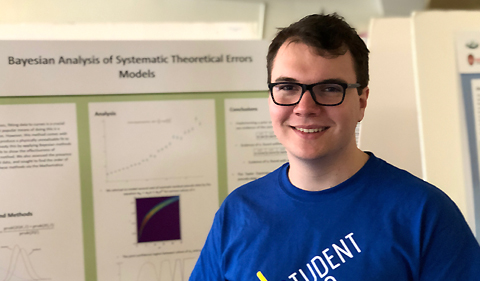By Ian Billig
(B.S. Physics, Honors Tutorial College, Class of 2019)
I studied methods in nuclear physics with Dr. Daniel Phillips, a professor in Physics & Astronomy. I worked with toy models (where the physics problem is simplified) to understand principles. My ultimate goal was to apply these methods in nuclear physics.
We mostly used two books, Data Analysis: A Bayesian Tutorial, by D.S. Sivia, and Bayesian Logical Data Analysis for the Physical Sciences, by P.G. Gregory. The toy model is a sort of simple mathematical model used for educational and demonstrative purposes that doesn’t necessarily have a physical application, but is good for showing that the math we are doing is “working” and could be applied to more complex or physically meaningful models.
In my internship, I’ve learned quite a bit about statistics in general, as well as how to use computers to numerically solve math problems that would otherwise be extremely difficult or impossible to solve. We would likely continue applying our methods of modeling errors to nuclear physics and experimental data if we had more time during the summer.
I met with Dr. Phillips at least a few times a week via Skype, then almost daily when he was in his office in Clippinger Labs. He’s been amazing in regards to helping me and making sure that I’m working along the right path. I love theoretical physics because I get to avoid a lot of the headaches of experimental physics. Theoretical physics is nice because you don’t generally have to worry about some complex apparatus failing or potentially disastrous measurement error completely throwing off your results. It’s just you, some papers, books, and a computer. I also like it because it’s pretty much just mathematics and programming, which have always been some of my favorite fields of study.
To any prospective physics students—if you enjoy mathematics and want a great educational experience that teaches you some very useful skills in math and programming, I would highly recommend interning in something theoretical. I came into the internship with not much experience, but along the way I’ve picked up many skills and learned things that have come in handy in my classes. My internship has helped me tremendously academically.




















Comments